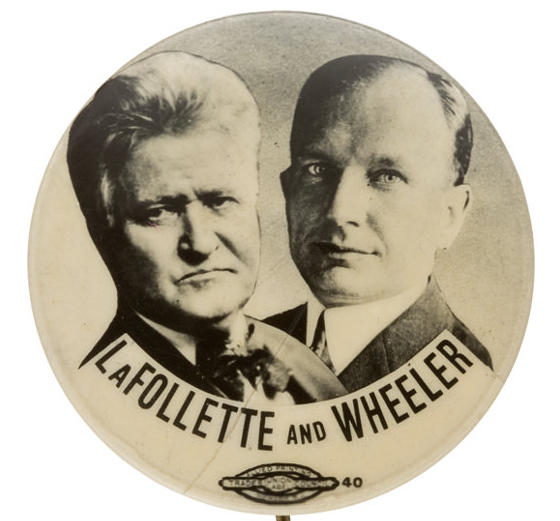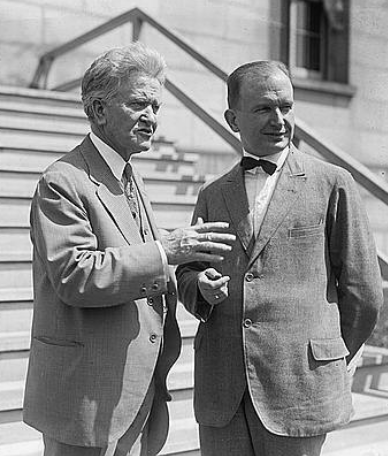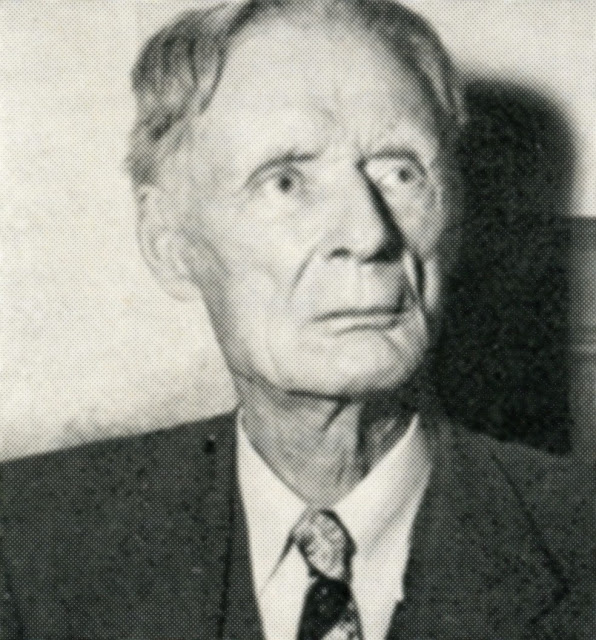In the old
OlyBlog days I had a series devoted to the Ungovernors of Washington State, people who ran for Governor but were never elected to that office. One such person was William Morley Bouck, who ran for Washington State Governor under the Farmer-Labor Commonwealth banner in 1936.
Bouck was also the very first Washingtonian to be a third party Vice-Presidential candidate, but he never made it to the ballot. His own party basically evaporated on a national level shortly after the nominating convention in 1924 and the campaign was dropped.
Here is his story as it was originally posted on
OlyBlog, Nov. 10, 2008--
https://www.olyblog.net/newWP/2008/11/10/ungovernor-1936-william-morley-bouck/
Ungovernor, 1936 – William Morley Bouck
When William Morley Bouck ran for Washington State Governor in his final bid for public office, the most colorful part of the old Granger’s career was behind him. Carlos A. Schwantes called him, "A complex man who publicly delighted in goading the rich and powerful and clearly hoped to lead American farmers into a brave new world." Farmer, family man, teacher, renegade Grange Master, a radical arrested on conspiracy charges, Congressional and Vice-Presidential candidate, Bouck has attracted the attention many historians and writers, including Nirvana’s Krist Novoselic. But few of them seem aware Mr. Bouck can be counted among the Ungovernors.
Bouck was born Sept. 5, 1868 in Independence, Iowa, the son of John Stacy Bouck, a Methodist circuit-riding minister and farmer, and Elizabeth Dawson (Elliott) Bouck. His great-uncle, William C. Bouck (1786-1859), was a Democrat who served one term as Governor of New York 1843-1844.
The Bouck family moved to Royalton, Minn. in 1879. Their next door neighbor was August Lindbergh, Grandfather of Lucky Lindy. Will attended school in Princeton, Minn. around 1885. He became a teacher and worked in Clear Lake, Minn. (1888), Santiago, Minn. (1890) and Milaca, Minn. (1890). In Milaca he was appointed Postmaster and worked as a timekeeper in the local mill as well. On Aug. 27, 1891 he married another teacher, Lura Adelia Snow, in Princeton.
Following other family members, Will and Lura moved to Silverton, Wash. in June 1893. Silverton was a mining boom town in central Snohomish County. Before the mines closed in 1895, Bouck had served as Postmaster, operated a general store, worked in logging, mining, surveying, and purchased a small farm. The Boucks lived in Cheney for a brief period, 1896-1897, returned to Silverton 1897-1902, and finally settled for good in Sedro-Woolley.
Will and Lura started a farm and had a business growing tulips and other ornamental flowers. The Boucks also sold milk, berries, and produce. By and by the couple had five children.
William M. Bouck had been politically active during these years. As Schwantes explains, "People described Bouck as a large, powerfully built but quiet and purposeful fellow who pursued his reform goals with the tenacity of a bulldog. He was by turns a crusading Populist, a Bull Moose Progressive, and an early and avid supporter of the Nonpartisan League, a movement with socialist overtones that in 1916 swept out of North Dakota like a prairie fire. He was also a member of the Western federation of Miners and had experienced industrial violence firsthand."
According to author Gus Norwood, Bouck had organized 35 granges for the Washington State Grange. Krist Novoselic provides a nice summary of Bouck’s rise: "Carey B. Kegley served as state Master (President) from 1905 to 1917. An ardent progressive, he made enemies of conservative Washington State politicians; a group he derided as the ‘Fish, Sawdust and Whiskey Gang.’ Kegley also aggravated the leadership of the conservative National Grange. Master Kegley died in office [Oct. 29, 1917]. As Overseer, (Vice President) William Morley Bouck became acting state leader of the 15,000 member organization."
Under Bouck the Grange membership grew another 50% to over 20,000. Although the Grange supposedly was neutral regarding political parties, Bouck was tied to the Nonpartisan League and was held in deep suspicion by the business community. At the June 1918 Grange Convention at Walla Walla, the situation turned ugly when Bouck was elected Grange Master on his own. Marilyn P. Watkins writes: "Many outside the organization viewed Bouck’s election as an endorsement by the State Grange of the NPL. Walla Walla citizens were primed to respond. At ten o’clock on the evening of June 6, 1918, the State Grange’s installation ceremony for their new officers was interrupted by a delegation from a Walla Walla citizens’ meeting backed by a number of ‘husky’ gunmen gathered outside. The delegation gave the Grange thirty minutes to vacate the hall. Fifteen minutes of arguments produced no change of heart, so the Grangers closed their meeting in due form, then marched from the hall carrying the flag and singing ‘America.’ The Grange was unable to find another meeting site in Walla Walla. The town mayor and sheriff refused to guarantee the safety of the Grangers. The executive committee sent a telegram to governor Lister, the former Populist, requesting use of the National Guard armory located there. They received no reply. Committees conducted their business in hotel rooms, and the executive committee finished up the necessary work in the more hospitable– or at least anonymous– environment of Seattle."
Bouck used his position as a political platform. He toured the state and gave speeches concerning the Great War and economics. Novoselic: "… At the Bow Grange, he called on increasing taxes on the wealthy to finance the war effort. He opposed mortgaging the war through the sale of Liberty Bonds and worried about a war debt that could exceed $100 billion. In the course of the speech, he invoked the term ‘rich man’s war’ many times. There were groans and loud talking at the back of the room. While driving to Burlington, all four of Bouck’s tires went flat. It was obviously sabotage. It’s speculated mischief-makers also testified to a secret grand jury in Seattle about Bouck’s remarks."
According to one government document, one such informer was Bow Postmaster David R. Gilkey, who told the Feds he heard Bouck say: "If I am disloyal President Wilson is worse than disloyal; he is a traitor. When you buy a Liberty Bond you are merely piling up a mortgage for your children to pay. Liberty Bonds ought not to be sold. The war should be paid for by direct taxes …" Another informer was Clifford R. Conn, who quoted Bouck as saying: "If the Non-Partisan League is disloyal then President Wilson is a traitor. Farmers, you have been asleep for 30 years; by joining the League we could take over the Government and control it … there is no democracy today and we are forced to fight against our will."
And as a result of this speech, Will Bouck joined the club of Ungovernors who were arrested for being an Official Pain in the Ass to the status quo. He was busted in August 1918 under the Espionage Act for interfering with the War effort. The trial was set for Oct. 22, but was delayed until January 1919 due to the influenza pandemic. Meanwhile, the War ended on Nov. 11, and the prosecutors were having trouble putting together an airtight argument. The case was dismissed Dec. 21, 1918.
The experience moved him closer to the Left. Schwantes: "For both William Bouck and the farmer-labor movement, World War I had been a time of trial. Both survived the ordeal but both were changed by it. Bouck emerged from the harassment more alienated and more outspokenly radical than before."
In 1920 Will ran for U.S. Congress in the 2nd District under the banner of the newly formed Farmer Labor Party. He was the only challenger to 3-term incumbent Republican Rep. Lindley Hoag Hadley (1861-1948). He ran a strong campaign and finished with an impressive 26,398 votes (40.17%). Of this election, Schwantes said: "Bouck’s 1920 Congressional race represented the summit of his public life."
During the same month as the 1920 election, the National Grange Convention in Boston was not pleased with the Washington State Master. According to Norwood, "Bouck was charged and forced to stand trial on grounds of ‘injecting partisan politics into the Grange’ and seven other charges, filed by a Yakima attorney. Three charges were thrown out. He was convicted on five trumped up charges, required to apologize, receive the National master’s reprimand and then renewed his pledge to uphold the order. It was a galling experience, and added much to Bouck’s bitterness."
That bitterness found expression in what was probably the most controversial speech of Bouck’s career, given at the 23rd Annual Session of the Washington State Grange held at Colville, June 7-10, 1921. Some excerpts:
"During the war just passed, brought on with the design of preventing the further growth of democratic ideas, during which the opponents of democracy under the guise of patriotism, sought to imprison and hound to death progressive leaders and thinkers, we had an abiding trust that somehow, someway, simon-pure democracy was to be handed to us from above. But democracy is never handed down– citizens establish it. They do not receive it. We are in much worse state than ever before in our history. The reign of greed, and the subjection of the producer has been fastened upon the people with iron shackles. Our state and nation are in the iron grip of a ‘dollar-ocracy’ more greedy, more relentless, than any autocracy of modern or ancient history. Our shops and mines have become slave pens and shambles where more widows starve and more children drag out a miserable existence, than in the slave marts of ancient Rome or Carthage. In a state where rulers are made in the counting houses, where courts receive their instructions from the money changer, and where the schools are used as an adjunct to a corrupt, lying oligarchy of money, citizenship cannot develop or blossom freely …"
"Of course the Grange is in politics– to stay until the farmer is emancipated– what else could a self-respecting body of farmers do? How the Grange could keep out of politics and function at all is a conundrum to me … To say a Grange can not discuss vitally important political questions is like telling a person not to breathe– he must breathe to live."
"America should hang her head in shame at the treatment of our workers by the industrial Overlords of the country."
"If governments were operated for service, not pillage, as at present, we would all receive more nearly universal justice. In a land so wonderfully rich and whose opportunities have been so vast there should be a partnership of the people with all sharing in the mutual benefits. To lavish benefits upon the few, and leave the many in penury and want seems so wrong and unnecessary that one wonders how human beings of ordinary intelligence can tolerate the system that permits such conditions. Our government at present consists of those who prey like vultures upon the rest of humanity and the masses are mere chattels. This has been brought about largely by taxation."
"Our legislature is a joke– but a serious one, for the people of Washington State– and we will never get rid of this perennial parasitic nuisance until we overcome our silly party superstitions. Their minds hark back to medieval ignorance and hate, not to Twentieth Century progress …"
"During the war we were regaled with promises, roseate and beautiful about the wonderful peace ahead of us, to lure us to more butchery and suffering and ruination, and what is the result? Nothing in past horrors can equal the present state of millions of workers, their wives and their children, as a result of the war. No work, no crops, no stock– starving, hopeless and death-sick– this is the peace we were promised during the war. And what was it all for? To bolster up a commercial system. A system of robbery and pillage, to crush radical ideas, to kill off a part of the leaders of the people and starve the rest into submission, and under the guise of lying patriotism, to pass syndicalist laws and other medieval acts to oppress the toilers."
"Let us quit kidding ourselves with the idea that we are Divinely appointed to rob and murder other nations under the guise of Christianity. Let us Christianize and educate ourselves a little at home, before we engage in a so-called divinely appointed murdering and pillaging business abroad."
"The men who made billions out of war profits are going free with their loot …"
"Militarism is the result of ignorance and the profit system– the costliest thing in the world … Let’s organize against this terror of capitalism– its tool in fact. Let’s agree to pay no taxes– to lend no aid– to refuse to serve as soldiers for our government or any other to carry on war, except to repel invasion."
"Perhaps nowhere in our shameful history of dollar worship have we descended to such depths as in the kind of newspapers we tolerate and support … Our papers are the publicity agents of the trusts, the promoting banker, gambler, the speculator, and the manipulator of money and bonds. They do not want the truth. They are the agents of whoever can and will put up the most money and they will slander, vilify, ruin and steal the character or property of anyone for money. No reporter can succeed unless he colors the truth to serve some exploiting purpose. No editor can stay upon one of our metropolitan papers unless devoid of decency …"
"We take every old bit of superstition and bigotry we can find and cram it into our children’s minds, and then we call them educated."
Bouck knew what he was doing and expected trouble. Before the National Grange expelled him in Nov. 1921, he had already started forming a splinter grange, the Western Progressive Farmers (later called the Progressive Farmers of America in 1926). When Bouck walked, he took about 5000 members with him.
Meanwhile, Bouck had remained active in the Farmer Labor Party. This organization experienced strife concerning the presence of Communists. At their 1924 convention in St. Paul, Minn., the FLP considered endorsing Progressive Sen. Robert LaFollette, but the Senator would have none of that– he hated Communists. So the FLP nominated Duncan McDonald for President and William Morley Bouck as his running mate. Bouck was a VP candidate less than a month, for shortly after the nominations the national party made the decision to disband. Some state FLPs, however, continued to limp along, including Washington’s.
But as the Jazz Decade edged closer to the Stock Market Crash, the FLP faded and so did Bouck’s renegade grange. He made another run against Rep. Hadley in 1930, running as a FLP candidate. No Democrat entered the race, and Will placed second with 3,428 votes (6.45%). The eccentric August Toellner, "The Marrying Justice of the Duwamish," placed third and a Communist was last.
Lura Bouck died Feb. 3, 1936. Maybe her death was related to Will’s decision to run for Governor, maybe not. He was 68 years old.
Running under the Farmer-Labor Commonwealth label, Bouck’s entry into the crowded field was not exactly greeted with banner headlines.
The Centralia Chronicle editorialized Oct. 22, 1936: "Some years ago William Bouck of Sedro-Woolley was master of the State Grange. He was the leader of the extreme left wing element among the farmers. He is now the candidate for governor of the Farmer Labor party ticket and may be given the endorsement of the Washington Commonwealth Federation. It is but natural that Bouck will support President Roosevelt for re-election. It is also natural that he is pledged to the production-for-use program and government ownership of everything in sight. The announcement that Bouck would be a candidate for governor seeking the support of the radical element is a part of the old program in this state, more or less successful, attempting to ally the farmers with organized labor …"
One campaign photo of Bouck accompanying an announcement of a speech he will give in Seattle shows a tough and alert looking older gentleman.
Bouck finished 5th out of 8 candidates with a paltry 1,994 votes (0.30%).
William Morley Bouck died Oct. 24, 1945 in Sedro-Woolley Memorial Hospital after being ill for several months.















































